An online MBA in India is a business degree you can complete from anywhere using the internet. It offers the same curriculum as a regular MBA but gives you the freedom to study at your own pace—perfect for working professionals or students who need flexibility.
But here’s the catch: not all online MBAs in India are officially recognized. That’s why checking for UGC or AICTE approval is important. It ensures your degree is valid, respected, and accepted by employers or for further studies.
Understanding AICTE and UGC: Online MBA in India
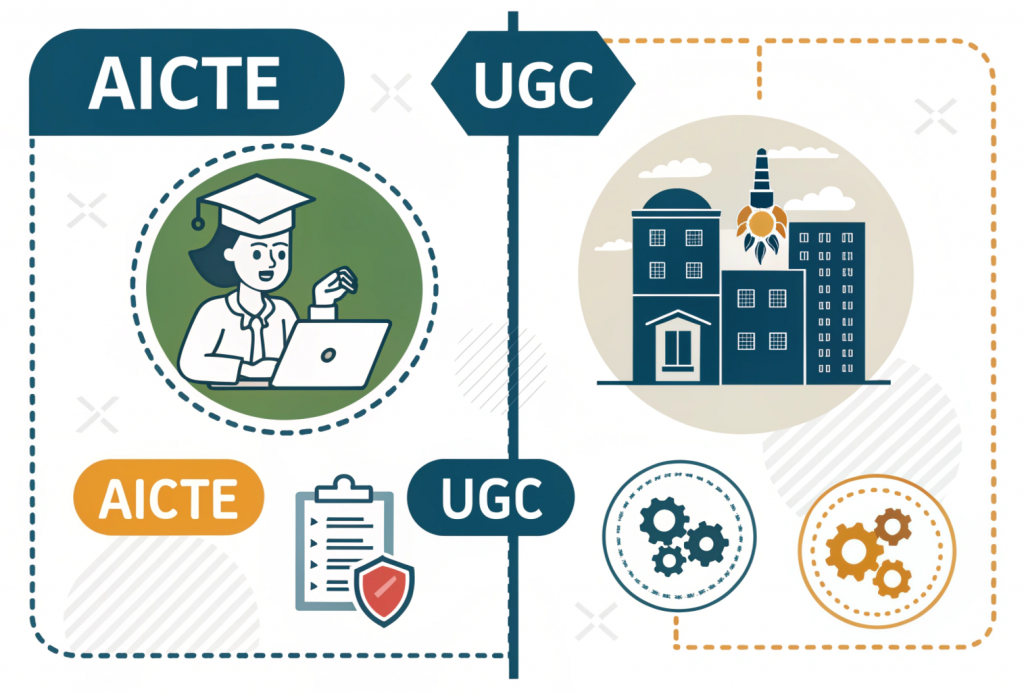
When looking into online MBAs, two names keep popping up: AICTE and UGC. So, what are they, and why do they matter?
AICTE, or the All India Council for Technical Education, is the body that oversees technical and professional education in India—things like engineering, management, and pharmacy. If a college wants to offer MBA, PGDM, or engineering courses, AICTE usually steps in to make sure the program meets quality standards.
On the other hand, UGC, or the University Grants Commission, looks after universities in general. It’s the top body that gives recognition to universities and ensures they follow academic standards. If a university is UGC-approved, that means it’s officially recognized by the Government of India to award degrees—including online degrees.
In short:
- AICTE = Technical course regulator
- UGC = University and degree authority
For online MBAs, UGC approval is a must, especially from its Distance Education Bureau (UGC-DEB). AICTE approval may or may not be required, depending on the type of institution and program.
AICTE Approval for Online MBA
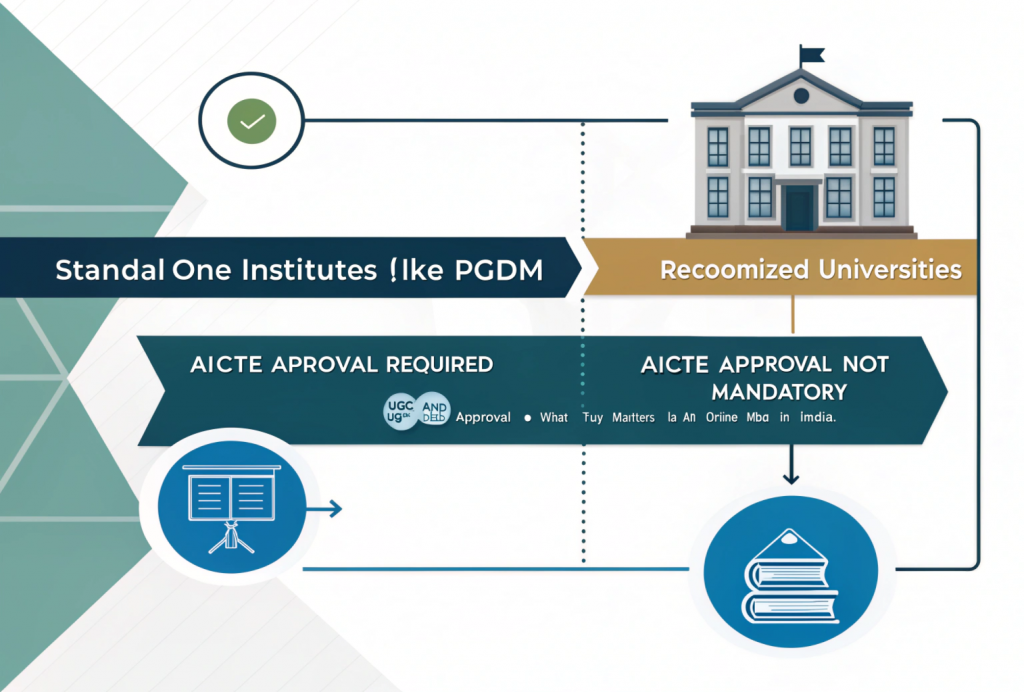
Now, let’s talk about AICTE approval—do you really need it for an online MBA?
Here’s the short answer: Not always. AICTE mainly regulates technical and professional courses like engineering, management (including MBA), architecture, etc., especially when these are offered by standalone institutions like business schools or private colleges.
If an institute only offers diploma or PGDM programs and is not a university, then AICTE approval is a must.
But if the online MBA is offered by a UGC-approved university, then AICTE approval is not mandatory. That’s because universities come under UGC’s jurisdiction, and UGC gives them the authority to run degree programs—including MBAs.
So to simplify:
- AICTE approval is required for standalone management institutes (like those offering only PGDM).
- AICTE approval is not needed if the MBA is offered by a UGC-recognized university.
In the end, if you’re looking at an online MBA, just make sure the university has UGC and UGC-DEB approval. That’s the green signal you need.
Explore our online programs to become future-ready
Transform your career with industry-aligned courses designed by experts.
UGC Approval for Online MBA
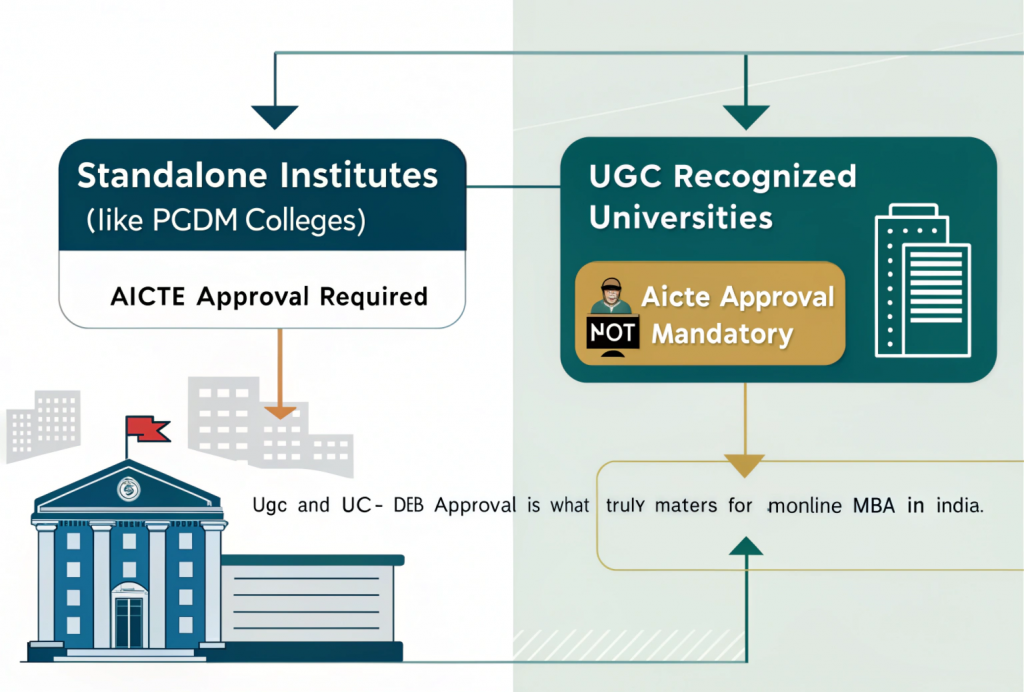
When it comes to online MBAs in India, UGC approval is the most important thing to check.
The University Grants Commission (UGC) is the main authority that decides which universities are allowed to offer degree programs—both offline and online. In 2018, UGC released special guidelines for online degrees, making it clear that only certain universities can offer full-fledged online courses like an MBA.
But here’s the twist: not all universities can jump into online education. They must get approval from a special arm of UGC called the Distance Education Bureau (UGC-DEB). This body makes sure the university has the right setup—like digital platforms, faculty, and learning resources—to deliver quality education online.
So, when you’re looking at online MBA options, make sure the university is approved by both UGC and UGC-DEB. This ensures your degree is:
- Legally valid,
- Recognized across India, and
- Accepted by employers, government exams, and higher education institutions.
You can even check the official UGC-DEB website, which regularly updates the list of approved universities offering online MBAs.
Always double-check the university’s status before enrolling—better safe than sorry!
Key Differences Between AICTE and UGC
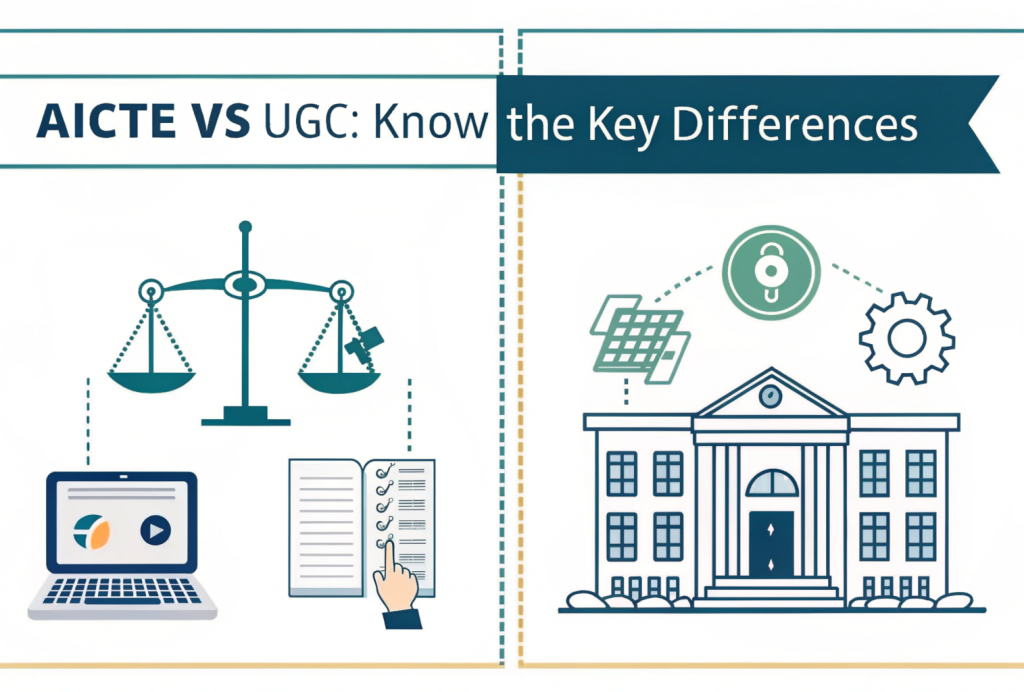
People often get confused between AICTE and UGC, especially when choosing an online MBA. Let’s clear that up with some easy-to-understand differences:
Mandate & Jurisdiction
- UGC (University Grants Commission) is responsible for recognizing universities in India. It sets the rules for how universities operate and ensures they follow academic standards.
- AICTE (All India Council for Technical Education) is focused on technical and professional courses like engineering, management, architecture, and pharmacy. It mainly regulates colleges and standalone institutions, not full universities.
Applicability to Online Programs
- For online MBAs, UGC plays the bigger role. Only universities that are UGC-approved and have permission from UGC-DEB can legally offer online degree programs.
- AICTE approval is not mandatory for universities offering online MBAs. But if the program is offered by a non-university institute (like a business school offering PGDM), AICTE approval is required.
Regulatory Power
- UGC has the power to grant degree-awarding status to universities. So if you want your MBA to be officially recognized, UGC approval is essential.
- AICTE ensures the quality of technical education in India, but it doesn’t grant degrees—it only approves courses and institutions.
Understanding who approves what can help you avoid fake degrees and make the right choice for your online MBA.
Which Approval Matters More for Online MBA?
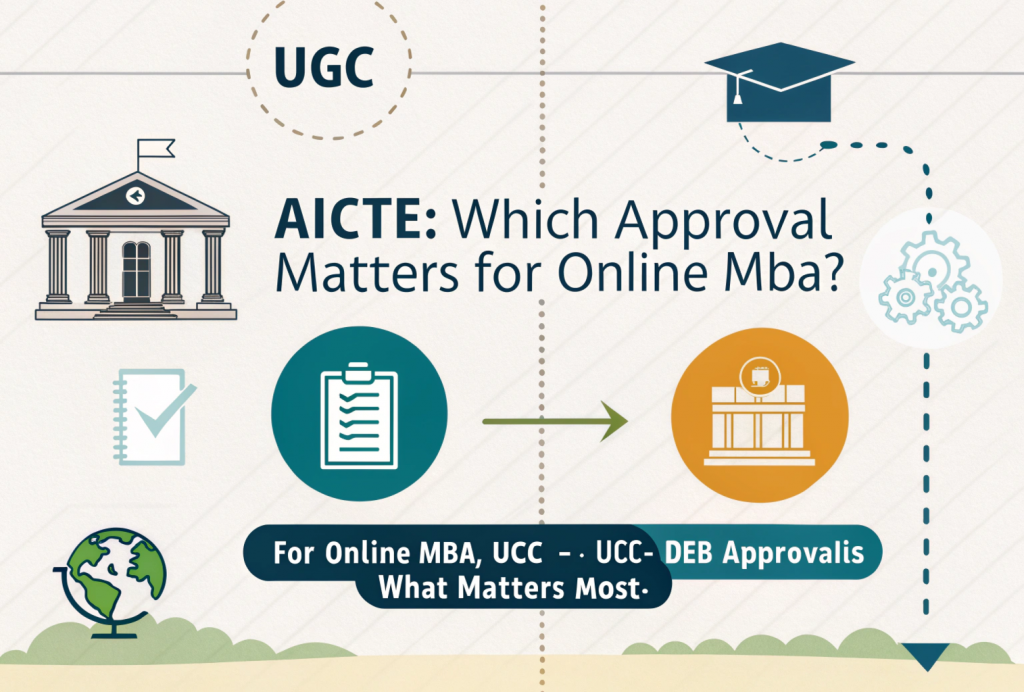
When it comes to choosing an online MBA, you might wonder—UGC or AICTE—whose approval actually matters more?
Let’s break it down in real terms:
Legal Validity:
If you want your degree to be legally valid in India, UGC approval is a must. Only UGC-recognized universities can officially offer degrees—whether it’s regular, distance, or online. AICTE doesn’t give degree-granting status; it mainly focuses on the quality of professional programs.
Employer Preference:
Most employers care about whether your degree is from a recognized university, not whether it has AICTE approval. As long as your online MBA is UGC-approved (and preferably from a well-known university), it’s usually accepted in both private and public sectors.
International Recognition:
If you plan to work or study abroad, UGC approval becomes even more important. International universities and employers often check if your degree comes from a recognized institution, and UGC approval helps with that. AICTE, in most cases, isn’t considered internationally.
So, if you’re going for an online MBA, make sure the university is UGC-approved and listed under UGC-DEB. That’s what truly makes your degree valid and useful in the long run.
Red Flags: How to Avoid Unrecognized Online MBAs

With so many online MBA programs available, it’s easy to fall into the trap of unapproved or fake universities. Some may look legit, but the degree you get might not be recognized—making it useless for jobs or further studies.
Here’s how to protect yourself:
Check UGC-DEB and AICTE Portals
Before applying, visit the official UGC-DEB website and look for the list of approved universities offering online programs. If the university is not listed there, don’t take the risk.
Similarly, if it’s a standalone institute (not a university) offering PGDM or technical courses, check the AICTE website to see if it’s approved.
Verify Accrediting Agencies
Some shady websites throw around terms like “internationally accredited” or “AI-approved” without any real meaning. Always check if the accrediting body is recognized by UGC or the Indian government. If you’re unsure, a quick Google search or visit to the UGC portal can help.
Watch Out for Common Misleading Practices
- Institutes using names similar to famous universities (e.g., “Oxford Business School India”)
- Promises of “100% placement” without real data
- Degrees offered in just a few months
- No mention of UGC-DEB approval anywhere on their site
If something feels off or too good to be true, it probably is.
Doing a little research upfront can save you from wasting money and time. Stick to well-known, UGC-approved universities to stay on the safe side.
Conclusion
Choosing the right online MBA program isn’t just about picking a popular course—it’s about making sure your degree actually holds value. In India, that value comes from proper regulatory approval, mainly from UGC and UGC-DEB.
While AICTE plays an important role for technical and professional institutes, when it comes to online MBAs, UGC approval is what really matters. It ensures your degree is valid, recognized, and accepted by employers, government bodies, and even international institutions.
So before you apply, do a quick check on the UGC-DEB website, look out for red flags, and choose a trusted university. A little homework now can save you from big regrets later.
Your future deserves a degree that counts—make sure it’s the real deal.


Leave a Reply